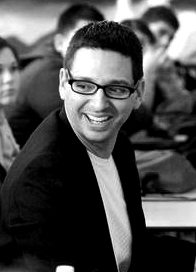“It was never about what we were doing, it was about who we are.”
NCTE Council Chronicle September 2012
The Mexican American Studies (MAS) program in the Tucson Unified School District (TUSD) had been a real success story.
Ninety-seven percent of students participating in the program graduated from high school, compared to 44 percent nationally, and 70 percent entered college compared to 24 percent nationally. Students scored higher on the AIMS (Arizona’s Instrument to Measure Standards) test compared to other Hispanic students who did not take the classes.
But in January the program was shut down and books used in the program were boxed up and put in storage. After a public outcry about book banning, the books were returned to the library but not to the classroom.
How could such a successful program have been cut?
“Everyone that has been in these spaces has left totally inspired by our students and the work we’re doing,” says Curtis Acosta, an English teacher at Tucson Magnet High School and in the MAS program.
“It is very difficult,” says MaryCarmen Cruz, a member of the NCTE Latino caucus and a teacher in the TUSD. “Some people believe that the law that was passed and the initiative was directed specifically at our school district.”
Established in 1998 by the TUSD to improve retention and graduation rates among Mexican-Americans, MAS’s curriculum and content presents material from the perspectives and experiences of Chicanos as well as from a range of other racial, ethnic, and cultural groups. It uses Critically Compassionate Intellectualism, which combines curriculum, emphasizing material about Chicano experiences, pedagogy, and close student-teacher interaction (authentic caring)
However, some Arizona politicians and Tom Horne, the former State Superintendent of Public Instruction, say that the MAS program promoted resentment of mainstream culture. Consequently, the legislature passed a bill in 2010 that took effect last December. That bill makes it illegal for a program to “promote the overthrow of the government, promote resentment toward a race or class of people, are designed primarily for pupils of a particular ethnic group, or advocate ethnic solidarity instead of the treatment of pupils as individuals.” In addition, the law authorizes the governor to withhold 10 percent of a school district’s state aid per month if found in violation of the law. 2010 also was the year that Arizona passed Senate Bill 1070, a wide-ranging law that sought to tighten the border and drive out unauthorized immigrants.
“Our students are critical thinkers,” counters Acosta. “We provide the soil for them to grow in. We nurture them. So for anybody to want to dismantle something that has a track record of student achievement that’s an anomaly within, not only the No Child Left Behind era but in TUSD and the state of Arizona itself, then they have another agenda.”
The troubles for MAS began six years ago with a speech by Dolores Huerta, cofounder of the United Farm Workers, who regularly visited the Tucson High Magnet School campus. In her speech she examined a broad range of social and political issues, at one point saying, “Republicans hate Latinos.” Then-School Superintendent of Instruction Horne and the assistant superintendent and fellow Republican, Margaret Garcia Dugan, took issue to that statement and came to the same school to give a rebuttal speech. During Dugan’s speech students were not allowed to ask questions, carry backpacks, signs or posters. To protest the ban on asking questions, about 80 students (not all of whom were in the MAS program) stood in a silent protest, taking off their outer t-shirts to reveal plain white ones printed with “you can silence my voice but never my spirit” and placed duct tape over their mouths, which Horne considered “rude.”
“It was never about what we were doing,” says Acosta. “It was about who we were, who our students were. Young people being empowered is scary to many people, institutions and establishments. Make most of those faces brown and black and now it is more complex. It taps into anti-Mexican sentiment and a tremendous amount of fear mongering and it lets these absurdities happen.”
Students across the district have continued to protest the closing of the MAS program. They have marched, they have addressed the school board, they chained themselves to chairs at a school board meeting that was going to vote on making MAS classes electives, and they have been arrested.
Acosta and other teachers tried over the years to meet with school board members and the state superintendent of public instruction to find out what precisely in the curriculum was objectionable. But, says Acosta, “no one ever came to the table and said ‘I’m uncomfortable with this lesson you are teaching.’ Mr. Horne doesn’t even know what we’re teaching.”
“We have people so poisoned against us that they won’t even sit down and talk about what we particularly did that may have offended them,” said Acosta. “It’s just ‘I don’t like this and it’s got to go away.’ The data didn’t matter, the interactions didn’t matter, our overtures didn’t matter. None of that mattered.”
“The long-term effect of these actions is palpable,” says Acosta. “You leave an indelible mark on students violated by these actions. It shows the students that lack of evidence, an ideological agenda and political motivation supersede students’ academic growth, identity, hope and belief in a whole world. “
But Acosta and 10 other teachers continue to advocate for their students. They filed suit in 2010 saying the law is unconstitutional and deprives students of their first amendment rights. The suit names the Superintendent of Public Instruction and the State Board of Education. Arguments were heard last March and the judge’s ruling is being awaited.
“It’s a matter of establishing what are the students’ rights with regard to their education and how does censorship limit access to curriculum, and limit the voices who are already in the classroom and advocating for our students, for their culture,” says Cruz.
What is frustrating for Yolanda Sotelo, an English teacher in the MAS program and one of the litigants in the suit, is the arbitrary and uninformed way in which curriculum decisions are being made from on high. Her students read Chaucer, Beowulf and everything forward, she says, but they also get the great modern works of such Chicano authors as Pat Mora, Luis Alberto Urrea, Rudolfo Anaya and Tomas Rivera. And many of these authors speak to her students in ways that are deeply personal and effective.
It is not unusual for students to tell her that a work she’s assigned by Chicano authors like Matt de la Pena or Stella Pope Duarte is the first book that student had ever read cover to cover.
“When kids finish Mexican White Boy (de la Pena) they go out and read more by him,” says Sotelo, who teaches at Pueblo High School. “His story is their story. He was a reluctant reader struggling to figure out who he was.”
That book was banned, Sotelo was told, because of a fight scene in the book. But the fight isn’t the point of the book, she says. She teaches the book because it deals with themes of finding one’s identity and the conflicts and friendships created by what the main character is going through.
“We can talk about the characters and conflicts and everything else in these books just as well as we can Beowulf or Chaucer,” she says.
Besides, says Sotelo, plenty of approved books have fight scenes in them, including classics like John Steinbeck’s Of Mice and Men.
In another book, Let Their Spirits Dance, by Duarte, officials said there was a questionable sex scene in the book, but there is no such scene, she says. When Sotelo asked the officials if they had read the book they said no. It is not clear to her where they are getting their information.
In the face of these actions, what can teachers do to prevent this kind of censorship happening in their schools?
“First of all, don’t close your door. Don’t remain isolated in the class,” says Cruz. “Reach out to the network available within the community, not just the local community but the national community. Recognize that you are not alone. From all across the country people are signing petitions that are being sent to the school board and the state superintendant. That helps us recognize we are not alone.”
Cruz also reminds teachers to continually talk with parents, community members and to be able to explain pedagogically why they are teaching the books they are teaching.
A big concern of many teachers within TUSD is that people holding positions on the School Board and the Superintendant of Public Instruction are not educators and have no experience in pedagogy. That is perhaps one reason teachers are not being treated as the experts they are — professionals who are highly qualified to find the best material and means to teach their students.
“It’s frustrating to see someone who doesn’t have a background in education setting education policy,” Sotelo says. “I couldn’t become a police commissioner and set police policy.”
In order to protect their students’ best interests teachers must become politically engaged and active, Acosta says. What happened in Tucson could happen anywhere.
“It boils down to legislative control over classroom content and curriculum and teacher voice,” he says. “The state took over our space and that can happen to anyone.”



0 Comments